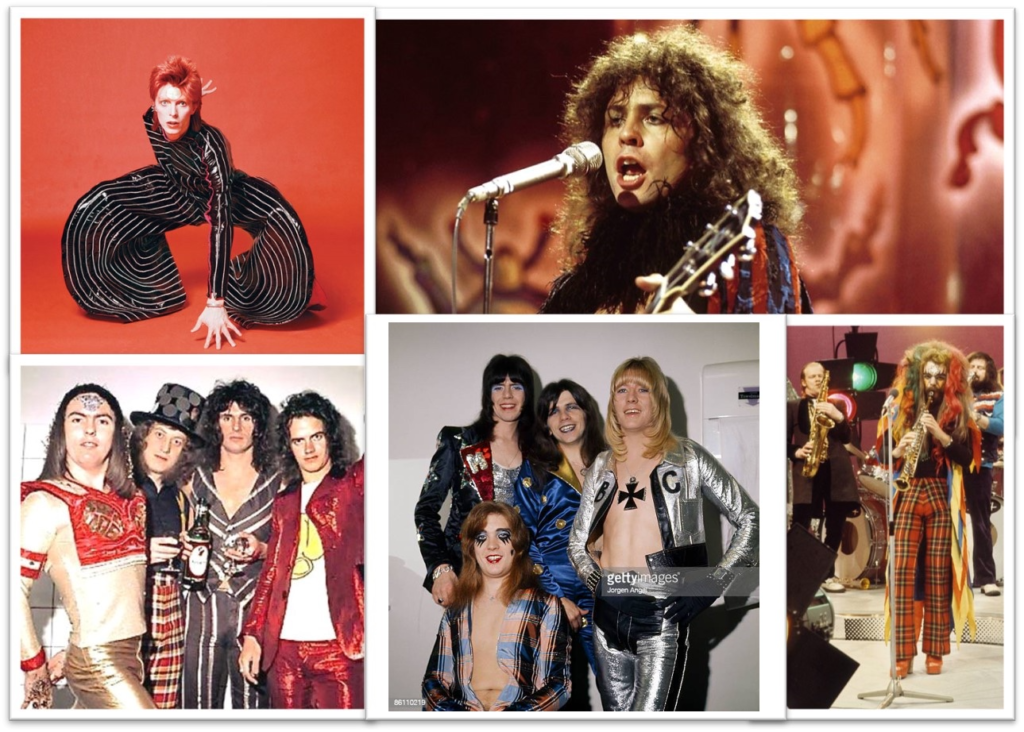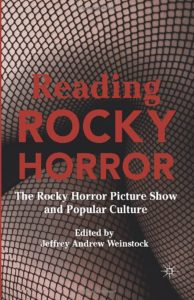From Wayne: My first exposure to The Rocky Horror Picture Show was back around 1980 or so. I was in college and working as a volunteer teaching assistant for the secondary gifted program in my incredibly rural home county. One of the students had a copy of the Official Rocky Horror Picture Show Movie Novel and the record of the soundtrack. A janitor found the Movie Novel left in the classroom and lost his shit. He turned it in to the principal, believing it to be little more than pornography and what the Hell was being taught in that gifted class anyway. The teacher was forced to sit through a no doubt uncomfortable meeting about this, and to her credit, went to bat for the students, eventually convincing the administration of the value of discussing these kinds of topics. I don’t know how she managed it, but kudos. The book was returned to the student and we all got the stink-eye from that janitor from that point on.
Being out in the country, we had no access to actually seeing the film, so my experience with it was exclusively through these artifacts. It would be a couple of years before I actually saw the movie at a midnight showing at the GeeBee’s shopping plaza in Washington, PA. It was the full-fledged audience participation event I expected. All of the props, all of the chaos. I vaguely remember someone tearing a toilet out of the floor in the men’s room, so there was a level of vandalism not usually associated with this as well, probably explaining why it was never screened there again.
I loved it. How could I not? The film was, and forgive my obvious metaphor here, a Frankensteinian collage of my favorite things: science fiction, horror, rock and roll, comic books, and sex.
Which probably says way too much about my priorities.
It’s hard to convey just how subversive this felt when it first appeared, or even when I first encountered it. These were topics no one talked about, at least not in polite company in middle America.
RHPS is pretty specifically a product of the time and place in which it was created. It was first staged in London in 1973, firmly at the height of the Glam Rock movement. Glitter, costumes, camp, and sexual ambiguity were the order of the day. T Rex, The Sweet, Slade, and David Bowie, among many others, were scandalizing the stodgy keepers of the status quo on record and on TV with overtly sexualized, gender-bending performances. Glam was a short-lived phenomenon in the music world (though I could make the case that it never went away, just reformatted). It’s lifestyle was too extreme. It served as a short transition from what rock music had been up to that point and what it was going to become.
But Glam wasn’t the only timely influence. A full blown 50s revival was in the air. Grease premiered on stage in 1971. American Graffiti hit the big screen in 1973 and Happy Days was just around the corner on the small screen in 1974. For all of its subversion, RHPS is drenched in nostalgia. The most obvious examples of this are the film references. The late night, science fiction picture show was part of 50s culture as much as doo wop. Frank was a mix of the horror movie icons of Dr. Frankenstein and Dracula, with Riff Raff as his Igor/Renfield. The reference to Fay Wray, followed by Rocky climbing a tower and getting shot down is less than subtle. Rocky himself is a parody of the Charles Atlas ads that ran in every comic book ever for decades (an exaggeration, but not by much). Body building, and the magazines dedicated to it in the first half of the 20th century are one of the direct influences on comic books and the superhero genre. While in love with these nostalgic artifacts, RHPS is also a dissection of the hypocrisy of the squeaky clean, Ozzie and Harriet vision of America in the era of of Vietnam and Watergate.
While many of the portrayals of gender and sexuality may seem dated by 2022 standards, this is arguably one of the first places, along with the Glam acts, where these ideas were expressed in what would become a widely experienced popular entertainment. I believe that millions of eyes witnessing this over the course of decades elicited a slow but steady change in our culture’s acceptance of these topics.
The experience of RHPS has always been more than just watching it as a movie. Friend of VoxPopcast and fairly regular guest Dr. Michael Chemers has written about the RHPS Performance Cult.* The movie transformed into a participatory experience as opposed to something that is simply watched. It has become a mystery cult, where virgins, those who have not seen the movie, are initiated into the shared group experience. There is a call and response, where the congregation shouts out specific lines in response to what is happening on screen. Props are brought to the theater to simulate the experience.
In many theaters there were performance troupes who dressed in costumes and acted out the entire film. You can see this in the movie Perks of Being a Wallflower, filmed here in Pittsburgh at the Hollywood Theater, which had a long history of showing the film (in 2008, when Chemers’ article appeared, Pittsburgh had only one of three theaters in the country that still did this). While I have certainly danced the Time Warp I never officially participated in these performances, though I know several people who did.
This level of identification with something is the essence of religious experience, and if I may go out on a limb, of intense fandom of anything. We identify with something larger than ourselves and wish to emulate it. Fans go to concerts dressed as Ziggy Stardust, Alice Cooper, and KISS. We wear the sports jerseys of our favorite players. Comics conventions are filled with cosplayers with dozens of Deadpools, Harley Quinns and Doctor Whos. We pull on the sacred raiments of our obsession and engage in Participation Mystique.
While the appeal of this weird little movie has endured, the experience of it in its natural habitat – the midnight movie house – has all but disappeared, changing the communal experience of it, and as a result, its reach and popularity with new audiences.
We want to talk about RHPS. There’s a lot going on here.
*Chemers, Dr. Michael. ‟Wild and Untamed Thing: The Exotic, Erotic, and Neurotic Rocky Horror Performance Cult.” in Reading Rocky Horror: The Rocky Horror Picture Show and Popular Culture. Jeffrey Andrew Weinstock, ed (Palgrave MacMillan: New York, 2008)






I’m definitely excited to see you guys are doing a Rocky Horror episode. This movie and the culture that formed around it meant so much to so many of us over the past 49 years. Hard to believe next year will already be RHPS’s 50th anniversary. I first experienced it when some TV channel, VH1 perhaps, aired it during the Halloween season when I was around 13 or 14 years old, and even without the important audience participation aspects it already was calling out to me and telling me that no matter how much of an outcast I felt like at the time there was a group of people out there waiting to embrace me as one of their own.
As a young teenage boy there were certainly aspects of the movie that attracted me that had nothing to do with being an outcast, the highly illicit and sexual nature of the content is an obvious draw to a hormonal teenager, and as a fan of old horror and sci-fi films it was exactly the type of movie I’d gravitate towards even without the counter cultural and illicit aspects. But the fact that it unabashedly embraced fluid gender dynamics, fluid sexuality, allowed for unashamed sexual desire, and that it was clearly giving a middle finger to conservative, normal society all made it clear even from just watching the movie at home in isolation of everything else that this movie was made for those of us that felt shunned by everyone else.
And then at age 17 I finally went to my first live audience participation show, complete with a shadow cast. I got to see this crowd of people in my small suburban area all embrace this counter cultural artifact. It was a whole new awakening, seeing just how wide spread this culture of outcasts willing to embrace anyone else that felt isolated and different was. By incorporating audience participation the audience is no longer just viewing this icon of abnormality, they’re actively invited to become a part of it, to join the movie in telling normal society to fuck off. The culture of initiating virgins, shouting callbacks at the screen in unison, and dancing the Time Warp together unites us in our own tribe of misfits who are willing to accept one another unquestionably no matter how different you are.
Other movies have tried this, most notably probably is Repo the Genetic Opera, but I have yet to find any that have done such an exquisite job of telling those at the fringe of society that you are not the strange ones, there is a whole new society of us that are happy to have you as one of our own while we point out the hypocrisy of main stream society. And while society has evolved and in many ways grown more accepting, it still has miles to go. There are still far too many out there that still can benefit from the experience Rocky has given to so many of us. In fact, I’m planning to hit up a showing here in Pittsburgh soon with a couple friends much younger than me, including one RHPS virgin, and I only wish it were far more prolific still so that all those that could benefit from the embrace of our outcast fandom had the opportunity to be brought into the fold.
I got to see it a few times in college in the late 80s. Midnight showing, full-blown costuming and props, I suspect it was mostly art/drama students showing off. However I was working a couple of jobs to pay for school, including closing shift at a restaurant with a bar, so only made it a few times.
On a lark I bought the 40th anniversary disc — it was hard to find ones that play in American Blu-ray players but finally got a deal on eBay or amazon. It’s an amazing thing to watch at home in the afternoon on a day where we’re snowed out from work. In the 80s I didn’t know who Tim Curry or Susan Sarandon were, I think Meatloaf was the only person I knew of (for the obvious 80s rock career). Looking at IMDB, Curry hadn’t done much, and I don’t think Witches of Eastwick came out until after I saw RHPS.
I suspect this will be a bit like talking about Burning man in the late 90s and early aughts. We all went to the same place and had completely different experiences.
❤️
❤️
❤️
❤️